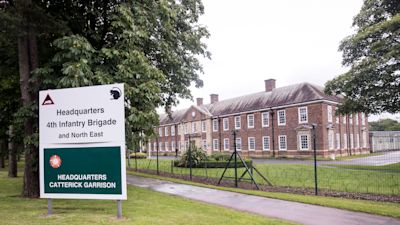Robert Jenrick reveals plan to house asylum seekers at Catterick Garrison

The Army's biggest operational garrison could be used to house asylum seekers, the government's immigration minister has said.
Robert Jenrick said Rishi Sunak was "showing leadership" by "bringing forward proposals" to use barracks in Catterick Garrison in his constituency to address the problem of migrants arriving in the UK in small boats.
The surprise announcement came as Mr Jenrick unveiled plans to house thousands of asylum seekers in disused military bases to accommodate their "essential living needs and nothing more".
Mr Jenrick confirmed that RAF Scampton in Lincolnshire and RAF Wethersfield in Essex will house migrants despite threats of judicial challenges from Tories in the areas.
Catterick, which is in the Prime Minister's Richmond constituency, had not been suggested as a potential location for asylum seeker accommodation until Mr Jenrick addressed the Commons on Wednesday.
Unlike the other earmarked sites, it is still in use as a military facility.
Situated near the Yorkshire Dales and the North Yorkshire Moors, the garrison primarily serves as a base for the 4th Mechanized Brigade and supports the Infantry Training Center (ITC).
According to the Army it has a population of about 13,000, which is more than that of the neighbouring Catterick village. It currently has 19 barrack compounds, including several other facilities. The garrison has 20,000 acres of military training area.
Mr Jenrick told the Commons the Government remained committed to its "legal obligations" to house the destitute.
"But we're not prepared to go further. Accommodation for migrants should meet their essential living needs and nothing more. Because we cannot risk becoming a magnet for the millions of people who are displaced and seeking better economic prospects," he said.
The news about Catterick comes after similar plans for the former RAF base at Linton on Ouse in North Yorkshire were scrapped.
More to follow.